

My English Place
English for tour guides.
Discover the magic of “English for Tour Guides” at MyEnglishPlace! This special section is your go-to resource for all things related to giving amazing tours. Dive into sample tour conversations, explore lessons on various tour topics, and boost your language skills. Whether you’re just starting or have been guiding for a while, our lessons are designed to make your tour guiding journey enjoyable and successful. Join us and let’s make your tours unforgettable with improved English communication!

The Importance of Tour Guide Introductions
Introduction: Think about the last time you went on a tour or traveled to a new place. One of the first things you likely experienced was the tour guide’s introduction. A warm and friendly welcome can set the tone for an enjoyable and memorable experience. In this activity, we’ll explore the significance of tour guide introductions.
- Why do you think a tour guide’s introduction is important in the tourism industry?
- Discuss how a positive introduction can impact tourists’ overall experience.
- Share your own experiences with tour guide introductions. What made a particular introduction memorable or forgettable?
- Consider aspects such as tone, friendliness, and information provided.
Sharing Experiences
- Recall a tour guide introduction that left a positive impression on you. What specific qualities made it memorable?
- Discuss with your classmates and note down any common positive elements.
- Share an experience where a tour guide’s introduction fell short. What aspects could have been improved?
- Discuss with your classmates and identify common challenges in ineffective introductions.
Here’s a list of key vocabulary related to greetings, introductions, and background information that can be used in the context of a tour guide introducing themselves to tourists:
- Good morning
- Good afternoon
- Good evening
- How are you?
- Nice to meet you
- It’s a pleasure to have you here
Introductions:
- My name is….
- I’m [Your Name]
- Allow me to introduce myself
- Let me tell you a bit about myself
- I’ll be your tour guide
- Today, I’ll be showing you around
- I’m here to assist you
- Feel free to call me [Nickname or Title]
Background Information:
- I’m originally from…
- I have been a tour guide for…
- I’ve lived in this city for…
- I’m passionate about sharing the history of…
- My expertise lies in…
- I have a background in…
- I’ve been working in the tourism industry for…
- I speak [languages spoken] fluently
- I’ve guided tours in various countries
- I love showcasing the unique culture of…
- I’m familiar with the local customs and traditions
Polite Phrases:
- If you have any questions, feel free to ask
- Please don’t hesitate to approach me
- I’m here to make your experience enjoyable
- Your comfort is my priority
- I hope you enjoy the tour
- Let me know if there’s anything specific you’d like to know
Sample Dialogues:
Dialogue 1: Classic Introduction
Tour Guide: “Good morning, everyone! Welcome to [City]. My name is Emily, and I’ll be your tour guide today. I’ve been working in the tourism industry for over five years and am excited to show you the beauty and history of our wonderful city. If you have any questions along the way, feel free to ask. Let’s make it a memorable experience!”
Dialogue 2: Cultural Emphasis
Tour Guide: “Good morning, everyone! Welcome to [City], a place where history and culture come alive. I’m Sarah, your guide for today’s journey. I have a deep passion for the rich traditions and stories embedded in this city’s tapestry. As we explore together, I’ll be sharing insights into the local customs and historical landmarks. If there’s anything you’re curious about or if you just want to chat, don’t hesitate to reach out. Let’s make this experience unforgettable!”
Dialogue 3: Enthusiastic Welcome
Tour Guide: “Hello, wonderful people! I’m Alex, and I am beyond excited to be your tour guide as we discover the magic of [City]. I’ve been exploring these streets for years, and each time feels like a new adventure. Today, I’m here to be your storyteller, sharing the fascinating tales of this vibrant city. If you have any burning questions or if there’s a specific spot you’ve been dreaming to see, I’m here to make it happen. Buckle up for a fantastic journey!”
Exploring Warm Welcomes
Introduction: Consider the impact of a warm welcome on your own experiences when entering a new place. A friendly greeting can make a significant difference in how you feel during a tour. Let’s explore the elements of a warm welcome and how they contribute to a positive tourist experience.
- Think about a time when you felt genuinely welcomed during a tour or visit to a new place.
- Consider the factors that made that welcome memorable.
- Write down three adjectives that describe the atmosphere created by the warm welcome.
Key vocabulary related to welcoming tourists:
1. Welcome:
- Definition: To greet someone in a friendly and hospitable manner.
- “Welcome to our city!”
- “A warm welcome awaits you.”
2. Glad you could join us:
- Definition: Expressing happiness or appreciation for someone’s presence.
- “We’re glad you could join us on this tour.”
- “It’s a pleasure to have you with us.”
3. We’re excited to have you:
- Definition: Conveying enthusiasm and anticipation for the visitor’s participation.
- “We’re excited to have you explore our beautiful landmarks.”
- “Thank you for choosing our tour; we’re excited to share the experience with you.”
4. Make yourselves at home:
- Definition: Inviting guests to feel comfortable and relaxed.
- “Make yourselves at home as we begin our tour.”
- “Feel free to make yourselves at home; we want you to enjoy every moment.”
5. Delighted to meet you:
- Definition: Expressing pleasure upon meeting someone for the first time.
- “Delighted to meet you all; I’m your tour guide for today.”
- “I’m delighted to meet each and every one of you; let’s have a great time together.”
6. Enjoy your stay:
- Definition: Wishing visitors a pleasant and enjoyable time during their stay.
- “Welcome to our hotel; enjoy your stay with us.”
- “Enjoy your stay in our beautiful city; there’s so much to explore.”
7. If you have any questions, feel free to ask:
- Definition: Encouraging visitors to ask for information or assistance.
- “If you have any questions about the tour, feel free to ask at any time.”
- “I’m here to help; if you have any questions, feel free to ask along the way.”
8. Your comfort is our priority:
- Definition: Assuring visitors that their well-being and satisfaction are the main focus.
- “Relax and enjoy the tour; your comfort is our priority.”
- “We want to ensure your comfort throughout the journey.”
Dialogue 1: Urban Tour
Tour Guide (TG): “Good morning, everyone! Welcome to our urban adventure in the heart of [City]. I’m Lisa, your tour guide for today. We’re so thrilled to have you join us on this exploration. As we stroll through the bustling streets, I’ll be sharing fascinating stories about the history and culture of this vibrant city. If you have any questions or if there’s anything specific you’d like to know, feel free to ask. Make yourselves at home, and let’s embark on this exciting journey together!”
Dialogue 2: Nature Trail
Tour Guide (TG): “Hello, nature enthusiasts! I’m Tom, and I’m genuinely excited to be your guide for our nature trail adventure. Welcome to the breathtaking [National Park]. As we walk through the serene trails, you’ll discover the beauty of our native flora and fauna. If you spot any interesting wildlife or have questions about the surroundings, don’t hesitate to share. Safety is our priority, so I’ll also provide a few guidelines along the way. Now, let’s immerse ourselves in the wonders of nature and create lasting memories!”
Key Points:
- Both dialogues start with a cheerful greeting to set a positive tone.
- The tour guide introduces themselves warmly, expressing excitement about the upcoming experience.
- The guides encourage questions, making it clear that tourists are welcome to seek information at any time.
- A sense of hospitality is conveyed through phrases like “Make yourselves at home” and “Safety is our priority.”
- Focus on your tone of voice, ensuring it reflects enthusiasm and friendliness.
- Use welcoming phrases to create a positive atmosphere.
- Clearly state your role as a guide and express your excitement about the tour.
- Provide a brief overview of what the tour entails to manage tourists’ expectations.
- Encourage questions and assure tourists that you are there to assist them throughout the journey.
Navigating New Places – Guiding Tourists to Meeting Points and Explaining Tour Routes
Introduction: Think about the last time you visited a new place or joined a tour. Navigating unfamiliar surroundings can be both exciting and challenging. Let’s explore the challenges tourists may face when finding meeting points during tours.
Part 1: Discussion
- Think about or discuss the challenges tourists might encounter when navigating a new place.
- Consider factors such as language barriers, unfamiliar landmarks, or different cultural norms.
- Share your insights with a partner or teacher.
Part 2: Personal Experiences
- Individually, reflect on a time when you faced challenges finding a meeting point during a tour or travel experience.
- Consider factors that made it difficult or easy for you.
Conclusion: In this warm-up activity, we’ve explored the challenges tourists may face when navigating a new place. As we delve into the main lesson, keep in mind the insights gained from our discussions and consider how effective communication can address these challenges during tours.
Key vocabulary related to giving directions:
1. Turn left/right:
- Definition: Indicates a change in direction to the left or right.
- “At the corner, turn left and walk for two blocks.”
- “Turn right after the traffic light to reach the meeting point.”
2. Go straight ahead:
- Definition: Continue moving in the current direction without turning.
- “Go straight ahead until you see the large fountain in the square.”
- “Continue going straight ahead for about 100 meters.”
3. Meet at:
- Definition: Designates a specific location where individuals should gather or meet.
- “Let’s meet at the entrance of the museum at 10:00 AM.”
- “Our group will meet at the designated spot near the ticket booth.”
4. Follow the path:
- Definition: Instructs individuals to stay on a designated route or trail.
- “Follow the path through the park; it will lead us to the river.”
- “The hiking trail is well-marked; just follow the path up the hill.”
5. The meeting point is:
- Definition: Specifies a particular location where a group will gather or start the tour.
- “The meeting point is in front of the main entrance of the hotel.”
- “Our meeting point is at the central square; look for the guide with a red flag.”
6. Our route will take us through:
- Definition: Explains the path or course that will be followed during the tour.
- “Our route will take us through the historical district and then to the local market.”
- “During the hike, our route will take us through scenic viewpoints and lush forests.”
7. Cross the street:
- Definition: Instructs individuals to move from one side of the street to the other.
- “To reach the café, cross the street and turn left.”
- “Cross the street carefully at the crosswalk.”
8. Go around:
- Definition: Suggests moving in a circular or alternative path.
- “To avoid the construction, go around the block and rejoin the main road.”
- “You can go around the park to reach the playground.”
Dialogue 1: City Tour Meeting Point
Tour Guide (TG): “Hello, everyone! Welcome to our city tour. Our meeting point is right here in front of the iconic city hall. If you’re facing the building, we’ll be gathering on the left side near the large clock. It’s hard to miss. From there, we’ll start our journey through the historic district. As we walk, I’ll point out key landmarks, and we’ll eventually reach the beautiful riverside park. Any questions before we begin?”
Tourist (T): “Got it! We’ll meet by the city hall clock. What landmarks will we see along the way?”
TG: “Great question! We’ll pass by the old cathedral, the central market, and the historic square. Our route will take us through these cultural highlights, and you’ll get a glimpse of the city’s rich history. After that, we’ll head towards the riverside park, where we’ll have some stunning views of the skyline. Ready for an exciting adventure?”
T: “Absolutely! Looking forward to it.”
Dialogue 2: Nature Trail Exploration
Tour Guide (TG): “Good morning, nature enthusiasts! Our meeting point is at the main entrance of the national park, right next to the visitor center. As you enter the park, you’ll see a sign indicating the meeting point. From there, we’ll follow the trail that leads deeper into the forest. Any questions before we set off?”
Tourist (T): “Got it, meeting at the park entrance. What can we expect on the trail?”
TG: “Excellent question! The trail will take us through dense foliage, and we’ll encounter a variety of native plants and wildlife. Keep an eye out for informational signs along the path. We’ll reach a clearing with a breathtaking view of the waterfall, where we’ll take a short break. After that, the trail loops back to the entrance. Ready for a nature-filled experience?”
T: “Sounds wonderful! Let’s get started.”
- Both dialogues start with a warm greeting and clear instructions on the meeting point.
- The tour guides use specific landmarks or signs to guide tourists to the meeting point.
- Tourists are encouraged to ask questions, ensuring clarity and understanding.
- The guides provide a brief overview of the landmarks or highlights along the tour route.
Subscribe to get access to more English for Tour Guides lessons as well as 10+ sample tour dialogues. Topics include:
-Historical Sites -City Landmarks -Museum Tours -Safety Information -Transportation Details -Understanding Cultural Insights -A City Tour Dialogue -A Hiking Excursion Dialogue -A Brewery Tour Dialogue
AND MANY MORE… Subscribe to MyEnglishPlace for more!

- Already have a WordPress.com account? Log in now.
- Subscribe Subscribed
- Copy shortlink
- Report this content
- View post in Reader
- Manage subscriptions
- Collapse this bar

Tour – ESL Conversation Questions and Speaking Lesson
Welcome to our ESL discussion session on the importance of English language skills ! Let’s delve into how mastering English can open up a world of opportunities and enhance your travel experiences.
Join us as we explore the significance of English in communication, career advancement , and cultural immersion.
Get ready to engage in lively conversations and broaden your understanding of the power of language!
15 Conversation Questions About Tour
Conversation Questions:
- What’s the most exciting tour you’ve ever taken?
- If you could go on a tour anywhere in the world, where would you choose?
- Have you ever had a tour guide who made a tour particularly enjoyable or memorable?
- What’s one tour you’ve always wanted to go on but haven’t had the chance yet?
- Do you prefer guided tours or exploring on your own?
- Have you ever been on a food tour? What was the best dish you tried?
- How do you prepare for a tour in a new city or country?
- What’s the most adventurous tour you’ve been on?
- Have you ever taken a historical tour? What did you learn?
- What’s the most beautiful natural scenery you’ve seen on a tour?
- How do you choose which tours to go on when traveling?
- Have you ever been on a haunted tour or ghost tour?
- What’s the funniest thing that has happened to you on a tour?
- Do you prefer walking tours, bus tours, or boat tours?
- Have you ever taken a tour that exceeded your expectations?
Conversation Dialogue:
Alice: Hi, Mark! Have you ever been on a tour that left a lasting impression on you?
Mark: Hey, Alice! Definitely, I once went on a wildlife safari in Africa, and it was incredible. How about you?
Alice: That sounds amazing! I’d a great experience on a cultural tour in Japan. The temples were breathtaking.
Mark: Wow, Japan must have been fantastic! Do you think language skills are important when going on tours?
Alice: Absolutely, knowing some English helped me communicate with locals and understand the history behind the sites. How about you?
Words Related to Tours:
- Excursion – A short journey or trip, especially one taken for pleasure.
- Itinerary – A planned route or journey.
- Guide – A person who leads or directs others on a journey.
- Sightseeing – The activity of visiting places of interest in a particular location.
- Adventure – An exciting or unusual experience.
So, next time you go on a tour, remember to cherish every moment .
Whether it’s exploring a new city, tasting local cuisine, or hearing fascinating stories from a tour guide.
Each tour experience is unique and memorable in its own way, so make the most of it and enjoy every adventure that comes your way.
Happy travels!
Related Posts:
- Migration Conversation Questions – ESL Free Speaking Lesson
- Upper Intermediate – ESL Conversation Questions and…
- Free Speaking Lesson: Party – ESL Conversation Questions
- Free Speaking Lesson: Opening – ESL Conversation Questions
- Free Speaking Lesson: Pressure – ESL Conversation Questions
- Loyalty Conversation Questions – ESL Free Speaking Lesson
- Literature Conversation Questions – ESL Free Speaking Lesson
- Free Time Conversation Questions – ESL Free Speaking Lesson
- Joy Conversation Questions – ESL Free Speaking Lesson

- Start Learning
- Free Resources
- Manage Subscriptions
- Classroom Login
A Guide to Positive Conversations as a Tour Guide or Driver
- LLS English
- June 26, 2023
- One Comment
Being a tour guide or driver is more than just getting people from point A to point B. It is about providing a positive, informative, and enjoyable experience for the guest or customer. It starts with the initial conversation when you are the first person they meet upon arrival to your country.
This blog post will provide tips on how to make a great first impression and have positive conversations as a tour guide or driver. From greetings and introductions to the do’s and don’ts of conversation, this guide will give you the tools you need to start off the journey on the right foot.
Follow us on LinkedIn for useful articles for busy professionals learning English.
Breaking the Silence: How to Navigate Small Talk with Hotel and Restaurant Guests
Establishing Rapport & Finding Common Ground
As a tour guide or driver, it’s important to establish rapport and find common ground with your guests to build a positive relationship.
When you first meet your guests, use these phrases to create a comfortable atmosphere:
“Welcome to [name of country], it’s great to have you here!” “How was your journey here? Did you have a pleasant flight/drive?” “Is this your first time in [name of country]? What made you decide to visit?”
These simple questions help you to find some common ground with your guests and to show your interest in their travels. Listen carefully to their responses and use their answers to spark conversation and build a connection.
Another great way to establish rapport is by finding out your guests’ interests and preferences.
You can ask questions like:
“Are you interested in history, nature, or culture?” “What type of food do you enjoy? Have you tried any traditional dishes here yet?” “Do you have any specific activities or sights you want to see while you’re here?”
By finding out more about your guests’ preferences and interests, you can tailor your tour or drive to suit their needs and make their experience more enjoyable.
Overall, it’s important to remember that building rapport and finding common ground is about being friendly, engaging, and interested in your guests. Use these simple phrases to get the conversation started and create a positive atmosphere that your guests will appreciate.
10 Ways to Make Small Talk With Guests in English When You Work in a Restaurant or Hotel

Asking Open-ended Questions
As a tour guide or driver, one of the most important skills you can have is the ability to ask open-ended questions. These types of questions require more than a simple “yes” or “no” answer and can help keep conversations flowing smoothly.
Here are some examples of open-ended questions that you can use with guests:
What made you choose to visit this country/city/attraction? What do you hope to see or experience during your stay? How do you feel about the culture here? What do you find most interesting or surprising so far? What do you like to do for fun? What are some of your favorite things about traveling? Have you traveled to other countries/cities before? If so, how does this compare? What do you hope to take away from your visit? Is there anything in particular that you’re excited to try or see here? What has been your favorite part of your trip so far?
Remember, open-ended questions are just the starting point. Listen carefully to your guests’ answers and use their responses to guide the conversation. With practice, you’ll become a pro at keeping the dialogue flowing and helping your guests feel at ease.
If You Speak English as a Second Language, Here’s How to Make Small Talk With Your Restaurant Guests

Providing Information and Context
As a tour guide or driver, you play an important role in ensuring your guests have a memorable experience. One of the most crucial aspects of your job is to provide information and context about the places your guests are visiting.
Providing information means giving details about the sites and attractions, such as the history, significance, and cultural background of a particular place. Context means linking that information to the broader picture of the country, its customs, and way of life.
When providing information and context, keep in mind that your guests may have different levels of knowledge and interest. Some may be seasoned travelers, while others may be visiting your country for the first time.
Tailor your explanations accordingly, but always be sure to share interesting tidbits that can capture their attention.
You can also make your explanations more engaging by adding a personal touch. For example, you might share a personal anecdote about your own experience visiting a particular attraction or highlight how your culture is connected to a certain tradition. This can help your guests better connect with the destination and feel more immersed in the experience.
Remember, providing information and context is not just about giving facts and figures. It’s also about conveying enthusiasm and passion for the places you are visiting. When you demonstrate genuine interest and excitement, your guests will feel more engaged and interested themselves.
Top phrases to start chit chat with guests in hospitality roles

Making Connections
As a tour guide or driver, it’s important to make connections with your guests or customers. This means creating a personal relationship that allows them to feel comfortable and welcomed during their visit to your country.
To make connections, try the following:
- Listen carefully: Listen attentively to your guests or customers, and take note of their interests, questions, and concerns. This will help you tailor your conversation to their needs.
- Share your personal experiences : If appropriate, share stories or experiences from your own life that relate to the topics your guests or customers are interested in. This can help them feel more connected to you and your country.
- Show interest in their culture: If your guests or customers are from a different culture, show interest in their background and customs. This can help them feel valued and respected, and also provides an opportunity for learning.
- Be enthusiastic: Show genuine enthusiasm and passion for your job and your country. This energy is contagious, and can inspire your guests or customers to have a more positive experience.
Making connections with your guests or customers can create a lasting impression that will enhance their holiday experience and potentially lead to positive reviews or recommendations.
28 unbeatable phrases to make you sound like an all time professional speaker
Using Humor Appropriately & Only If a Casual Environment
Humor can be a great tool for breaking the ice and making people feel more comfortable in a new environment. However, it’s important to use humor appropriately and only in a casual environment.
Here are some tips for using humor as a tour guide or driver:
- Know your audience: Before making any jokes, consider the cultural background and language abilities of your guests. Some jokes may not translate well or could be considered offensive in certain cultures.
- Keep it light: Avoid making jokes about controversial topics or anything that could make guests feel uncomfortable. Stick to light-hearted, friendly jokes that everyone can enjoy.
- Follow the guests’ lead: If guests aren’t responding positively to your jokes, don’t push it. Not everyone has the same sense of humor, and it’s important to read the room and adjust accordingly.
- Don’t overdo it: While a well-timed joke can be a great way to build rapport with guests, too much humor can be overwhelming. Make sure to balance humor with providing valuable information and context about the destination.
Hospitality Employee? Here’s How to Politely Say No When You’re Pressed for Time
Navigating Cultural Differences & Being Aware
When you’re interacting with people from different countries and cultures, it’s important to be aware of any potential cultural differences that might impact the way you communicate with them.
Here are some tips for navigating cultural differences and ensuring positive interactions:
- Do your research: Take some time to learn about the culture and customs of the people you’ll be interacting with. This can help you avoid any accidental faux pas or misunderstandings.
- Be respectful: Treat everyone with respect, regardless of their cultural background. Avoid making assumptions or stereotyping based on someone’s ethnicity or nationality.
- Adjust your communication style: Depending on the culture you’re interacting with, you may need to adjust your communication style. For example, some cultures place a higher value on direct communication, while others prefer indirect communication.
- Avoid controversial topics: Be aware of any sensitive topics that may be off-limits in certain cultures, such as politics or religion. Try to steer clear of these topics unless your guests or customers bring them up first.
- Stay open-minded: Remember that cultural differences can be enriching and interesting. Be open to learning from your guests or customers and experiencing their culture in a positive way
By following these tips, you can navigate cultural differences with ease and ensure that everyone you interact with has a positive experience.

Dealing with Difficult Customers Or Guests Positively
As a tour guide or driver, it’s important to understand that not all guests or customers will be easy-going and cheerful. Some may be difficult to handle due to various reasons, such as cultural differences, language barriers, or even personal problems.
When dealing with difficult customers or guests, it’s important to remain calm and composed.
Here are some tips that may help:
- Listen actively: When a guest or customer is upset, it’s essential to let them vent out their frustrations. Listen to them attentively and make eye contact to show that you’re interested in what they’re saying.
- Empathize: Put yourself in their shoes and understand why they’re upset. Showing empathy and understanding can go a long way in diffusing the situation.
- Apologiz e: Even if the situation isn’t your fault, apologizing for any inconvenience caused can help calm the guest or customer down.
- Offer solutions: Work with the guest or customer to find a solution that satisfies both parties. If you’re unable to provide a solution, offer to escalate the matter to someone who can help.
- Stay professional: Even if the guest or customer is rude or aggressive, it’s essential to remain professional. Avoid reacting emotionally and stick to a neutral tone and mannerism.
- Learn from the situation: After dealing with a difficult guest or customer, reflect on what you could have done differently to avoid the situation. Learning from the experience can help you handle similar situations better in the future.
In summary, dealing with difficult customers or guests requires patience, empathy, and professionalism.
With the right approach, you can turn a negative experience into a positive one and leave the guest or customer satisfied.

Leave a Reply Cancel reply
Your email address will not be published. Required fields are marked *
Save my name, email, and website in this browser for the next time I comment.
Sign me up for the newsletter!
LEARN LAUGH LIBRARY
Username or email address *
Password *
Remember me Log in
Lost your password?
Get Daily Travel Tips & Deals!
By proceeding, you agree to our Privacy Policy and Terms of Use .
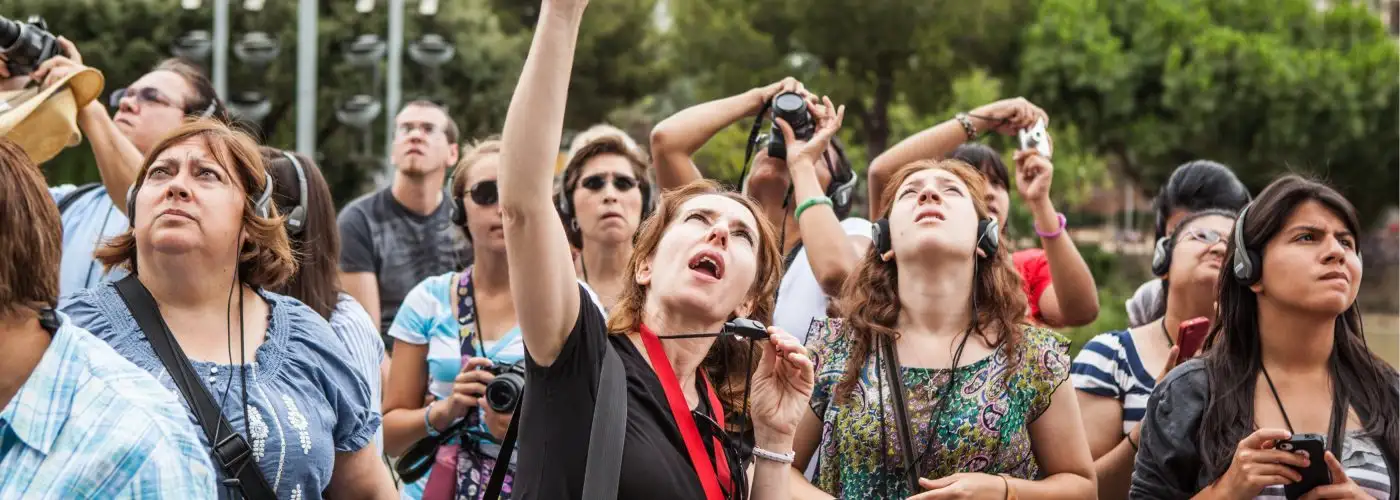
20 Questions to Ask Before Booking a Tour
Ed Hewitt started traveling with his family at the age of 10 and has since visited dozens of countries on six continents. He wrote for IndependentTraveler.com for more than 20 years, producing hundreds of columns on travel and offering his expertise on radio and television. He is now a regular contributor to SmarterTravel.
An avid surfer and rower, Ed has written about and photographed rowing competitions around the world, including the last five Olympic Games.
He's passing his love of travel on to the next generation; his 10-year-old son has flown some 200,000 miles already.
Travel Smarter! Sign up for our free newsletter.
While few truly independent travelers look forward in rapt anticipation to a guided tour, many will admit to a pang of curiosity (or, as the times would have it, FOMO) when they overhear a gifted guide explaining the history and context of a place. Even those who love wandering around on their own have likely experienced the benefits of an intimate small-group tour with a local expert.
If this seems familiar at all, and you are considering hiring a guide on an upcoming trip, here are some questions to ask before booking a tour.
1. Is the tour tailored to beginners or experts?
If you are going on a specialty tour (history, art, cooking) and you already know a lot about the subject, you might be bored silly by information that a non-expert would find fascinating. The reverse also applies; dense art historical information may not appeal to a lay person, for example.
2. Does the tour guide speak throughout, or is it an audio tour with headphones or other media?
Will you be learning from an individual or listening to a taped expert played over headphones? Each has its pros and cons; the former is ideal if you like to ask lots of questions and interact with an expert, while an audio guide allows you to customize the volume and go at your own pace.
3. Who is your guide?
Are the guides locals? Trained historians? Degreed naturalists? Whoever the company could find who needed a job? The personality and knowledge of your tour guide can make all the difference.
4. In what language(s) will the tour be given?
Clearly you will want the tour to be given in a language with which you have a degree of fluency so you won’t miss any important points. If the tour will be given in more than one language, you may want to ask if one language will be considered the main one for the tour. For some tours, translating to several languages can reduce the amount of time and detail the tour guide can give you, and often the information in one language is more cursory than another.
5. Is it all-inclusive, or will you have to pay additional admission fees?
If you will be visiting attractions during the tour, the price of the tour may be completely separate from the admission to those attractions. Be sure you budget for such additions so you don’t miss out on part of the tour.
Another way to ask this: What is not included?
6. Is food provided?
If the tour bridges a mealtime, ask if food is included in the price of the tour. If not, will there be time and opportunity to purchase something, or should you bring your own snacks? If food is available, what options are there? You’ll want to make sure the offerings suit your taste and dietary limitations.
7. What weather can you expect?
If your tour requires you to go up a gondola to a mountaintop covered with mist, or to get on a windy ferry to an island, or to walk for two hours in the summer heat, you’ll want to know ahead of time so you can dress appropriately.
8. How much physical exertion is required?
Unless it is a bus or boat tour, most guided tours require you to walk a bit. Find out how far, whether hills or stairs are involved and what shoes would be most appropriate.
9. Is the tour kid-friendly/handicap-accessible/etc.?
If you or anyone in your group has any special needs, even if they are as simple and common as being a young and restless kid, ask ahead of time if the tour will work well for that person.
10. Where does the tour pick up and drop off?
This seems like an uncomplicated issue, but that’s not always the case. Many tours operate without official offices, so they might meet at street corners, near a famous statue, on the steps of a museum … you get the idea. Take the time to map out how to get there from your lodging, as this is often the most difficult part of taking a tour (go figure).
11. How long is the tour?
You know your own threshold for being led around and told stuff; some may want hours and hours of information, while others want concise overviews before going on their own again.
12. How much time is spent in each place?
Sometimes folks on tours complain of having been rushed through a place they really wanted to see and absorb, while others report having had to linger over something in which they had little interest. If there are specific stops on the tour that are (or are not) important to you, a little research will help make sure you see what you want to see, and not more or less.
13. Are there other tours along the route?
Travelers who prefer to avoid the built-in crowds that tours bring with them can feel even more hemmed in when there are multiple tours all visiting and talking about the same thing at the same time. You can sometimes avoid this by taking your tour at off hours; first thing in the morning often works well.
14. What size is the group?
A tour that’s too big will make you feel like you’re walking around town in a giant swarm of tacky tourists; one that’s too small can feel awkward. (On a visit to Berlin some time ago, I spotted an American couple being led around by a tour guide who was nearly yelling in hopes of attracting the attention of potential additional subscribers. The couple was clearly uncomfortable.) Even if you like the idea of a small tour, find out whether there’s a minimum required number to keep the tour from being canceled.
15. Will you get to break off on your own?
Even on closely guided tours, it’s nice to be able to break off on your own a little bit, whether to linger in front of a painting, dwell on a beautiful view or read a historical placard. Many tours will give you a bunch of information followed by a little bit of time to poke around yourself.
16. Is it safe?
Having lived in New York in the early 80s, I find edgy urban environments fairly comfortable. But when I was considering a favela tour in Rio de Janeiro last year with a 9-year-old in tow, I asked specifically about safety on the tour. The guide’s answer suited me very well, and we enjoyed the tour with no problems.
17. Does pricing change by the week or day?
Many tour companies and guides offer peak and off-peak pricing, depending on when you come; you can save money by looking into your options.
18. What’s the inclement weather policy?
If your tour is outdoors, will you get a refund in foul weather, will you be rescheduled or will you simply be expected to show up and get wet/cold/etc.?
19. What’s the cancellation policy?
You’ll often have to schedule and pay for your tour ahead of time. Before putting any money down, find out what happens if you need to cancel or reschedule.
20. Is the tour well reviewed?
TripAdvisor, Yelp and other similar sites often have reviews of tours and even specific tour guides. Knowing as much as you can about other folks’ experience on a tour can be extremely helpful (and can give you answers to many of the questions posed above).
Have we missed any questions that are important to you? Let us know in the comments!
You May Also Like What Makes a Place Too Touristy? Walking Tours and Trips: What You Need to Know When Do You Need a Tour Guide? 8 Things Not to Bring Home from a Trip
Editor’s Note: IndependentTraveler.com is published by The Independent Traveler, Inc., a subsidiary of TripAdvisor, Inc.
We hand-pick everything we recommend and select items through testing and reviews. Some products are sent to us free of charge with no incentive to offer a favorable review. We offer our unbiased opinions and do not accept compensation to review products. All items are in stock and prices are accurate at the time of publication. If you buy something through our links, we may earn a commission.
Top Fares From

Don't see a fare you like? View all flight deals from your city.
Today's top travel deals.
Brought to you by ShermansTravel
London Cruisetour
Norwegian Cruise Line

Ohio: Daily Car Rentals from Cincinnati

Shop and Save with Country Inns...
Patricia Magaña

Trending on SmarterTravel
English Conversations for Tourists
Here is English vocabulary for some typical places of interest for tourists to a city, town, or the countryside.
Famous tourist attractions
There are many types of museum:
Local history museum / Town museum = where there are displays of objects found in the local area, or which are important to the local area.
Art gallery = where you can see paintings, photographs and sculptures, as well as exhibitions of particular artists.
In London (for example) there are many other types of museum, such as:
Natural History museum = a museum where you can see everything related to Earth and to the history and development of Earth, such as dinosaur skeletons, fossils, etc.
Science Museum = a museum where you can see scientific and technological developments and discoveries. Often these museums have interactive displays.
Others are Madame Tussauds (a waxworks museum), the London Dungeons (a museum which recreates historical events), a Maritime museum, the Imperial War museum and the Tower of London (an old prison which also contains the Crown Jewels).
Famous attractions
Tourists often visit churches and cathedrals , as well as other historic buildings.
Other attractions include historical sites of interest (such as Roman ruins and famous battle or burial sites), as well as parks, gardens, and stately homes (= big house owned by aristocrats) and castles .
Some palaces (= house for the royal family) or parliament buildings are also open to visitors.
Things to do
You can go and see an exhibition (in a museum or art gallery).
You can also go to a festival (such as a music or arts festival) or a fair (often an annual event with various stalls to raise money for a charity or a town).
You can also go to hear live music (a concert of classical music or a “ gig ” of rock or folk music).
Other cultural attractions are the opera , plays (with actors) and the ballet .
In some towns you can also go to the funfair (where you pay to go on rides ) and theme parks , such as Disneyland, for example.
Local attractions
These might be areas of natural beauty, such as mountains, lakes and the coastline. (See our page on Scenery vocabulary for useful words and phrases to describe the countryside.)
For towns on the sea, other places to enjoy can be a promenade (walking area next to the sea), a pier (a long walking area built out over the sea) and a lighthouse (tall building where a light shines to show ships where the dangerous areas of the sea are). The harbour (area where ships come in) can also be a popular area for restaurants and shops.
English speaking: Information for tourists and visitors
In the Tourist Information office you can ask about the opening hours (or opening times ) for parks, museums and galleries, etc.
You can also ask if there is an entrance fee or admission cost . For many attractions there is a car park nearby (but not always free parking ). Some parks, gardens and historical buildings are open to the public only at some times of the year.
You can also ask if there is a gift shop (or souvenir shop ) or refreshments (a bar or cafe that serves drinks, snacks or light meals).
Many tourist attractions arrange tours for visitors ( guided tours or audio tours ) and you can find information in brochures and leaflets (a one-page brochure folded vertically into two, three or four pages), or on posters and flyers (very small leaflet often left on cars, for example).
Now go on to the next page to get phrases to ask for and give directions: Useful English Phrases for Giving Directions

50 fun travel conversation questions
Travel conversation questions.
Free discussion worksheets with pictures to describe the topic of travel. Difficult words on this first printable include – pack, prefer, cruise, destination, thoroughly, gotten, accommodation, backpacking, international, furthest, and distance.
The travel conversation questions on worksheet 1 are –
1 – When was the last time you traveled? Where did you go?
2 – What is your favorite thing about traveling?
3 – Where would you like to travel to next? When do you think you will go there?
4 – How long can you travel before you start to miss home?
5 – What are the most important things to pack before you go traveling?
6 – What kinds of transport do you prefer to travel by?
7 – Are there any places in your country that you never want to travel to? Why not?
8 – Who in your family is the best person to travel with?
9 – Have you ever been on a cruise ship? Would you like to take a cruise?
10 – What kinds of activities do you like to do when you are traveling?
11 – Have you ever learned or tried to speak another language while traveling?
12 – What are the top travel destinations in your country? Have you been to them?
13 – How do you usually decide on a travel destination?
14 – Do you like to plan your travel thoroughly or just make it up as you go along?
15 – What do you think of backpacking? Would you like to try it?
16 – Have you ever gotten lost on your travels? What did you do?
17 – What kind of accommodation do you usually stay in when you take trips?
18 – What is the best way to keep your money safe when you go traveling?
19 – Have you ever felt scared or been in danger on your travels?
20 – How has COVID-19 changed travel in your country and internationally?
21 – Where is it your dream to visit? Do you think you will ever get there?
22 – What is the furthest distance you have ever been from your home?
23 – Do you prefer to travel alone, with friends , or with family?
24 – What is the first thing you do when you arrive in a new city?
25 – Do you use any websites or apps when you travel? What for?
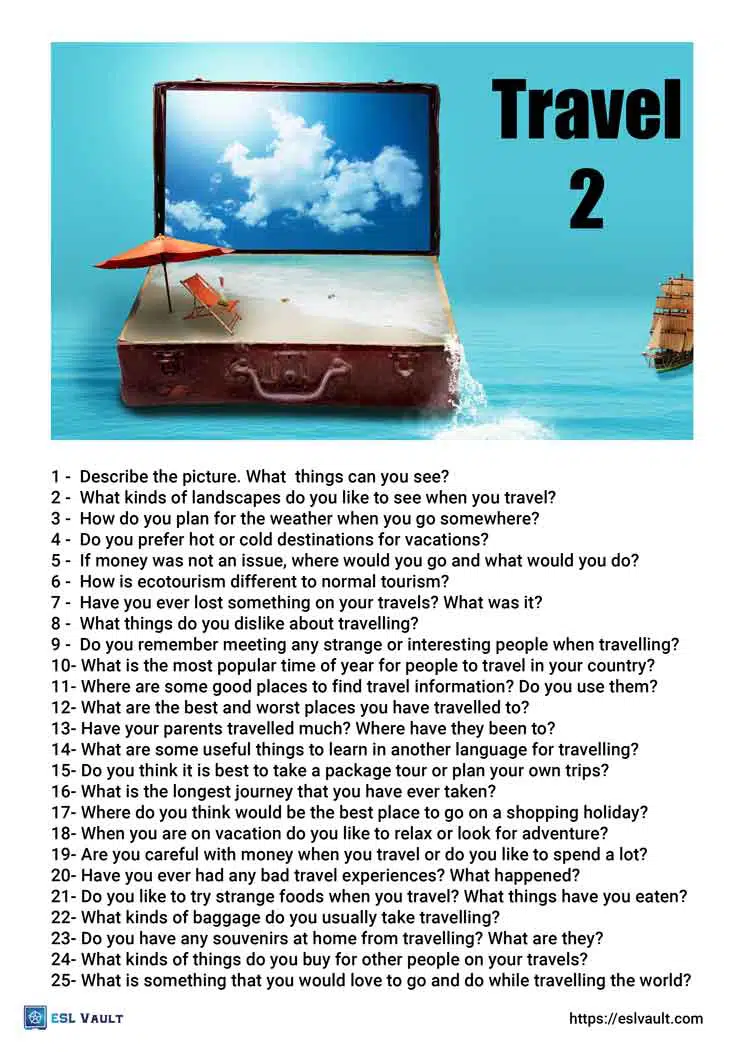
Travel conversation questions 2
Before starting the discussion with this second set of questions, be sure the students are familiar with the terms – landscape, ecotourism, issue (problem), journey, baggage, and souvenir.
On this second worksheet, the travel conversation questions are –
26 – What kinds of landscapes do you like to see when you travel?
27 – How do you plan for the weather when you go somewhere?
28 – Do you prefer hot or cold destinations for vacations?
29 – If money was not an issue, where would you go and what would you do?
30 – How is ecotourism different to normal tourism?
31 – Have you ever lost something on your travels? What was it?
32 – What things do you dislike about traveling?
33 – Do you remember meeting any strange or interesting people when traveling?
34 – What is the most popular time of year for people to travel in your country?
35 – Where are some good places to find travel information? Do you use them?
36 – What are the best and worst places you have traveled to?
37 – Have your parents traveled much? Where have they been?
38 – What are some useful things to learn in another language for traveling?
39 – Do you think it is best to take a package tour or plan your own trips?
40 – What is the longest journey that you have ever taken?
41 – Where do you think would be the best place to go on a shopping holiday?
42 – When you are on vacation do you like to relax or look for adventure?
43 – Are you careful with money when you travel or do you like to spend a lot?
44 – Have you ever had any bad travel experiences? What happened?
45 – Do you like to try strange foods when you travel? What things have you eaten?
46 – What kinds of baggage do you usually take when traveling?
47 – Do you have any souvenirs at home from traveling? What are they?
48 – What kinds of things do you buy for other people on your travels?
49 – What is something that you would love to go and do while traveling the world ?
50 – What is the best photograph that you have taken while traveling? Where were you?
Related activities
For further discussion you may want to use the transport conversation questions or the airport conversation questions . There are also transport and airport activities in the vocabulary worksheets archives.
For talking about weather and cities around the world there is also the weather pair work speaking activity.
You might also like these
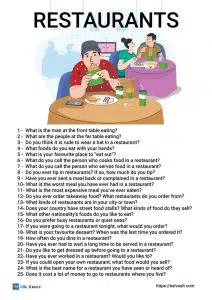
50 restaurant conversation questions
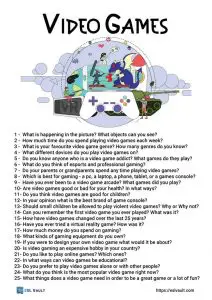
25 video games conversation questions

25 artificial intelligence conversation questions
Free ESL and English teaching resources, no sign up required. Just find what you like, download it and head to class!
Privacy Policy
Share ESL Vault with your friends!
- Writing Worksheets
- Vocabulary Worksheets
- Pronunciation
- Kids worksheets
- Idioms and Expressions
- ESL Puzzles
- ESL Pair Work Activities
- ESL Conversation Questions
- Coloring Pages
- Articles, Lists and Ideas
- Art and Craft Activities
EnglishPost.org
60 Travel Conversation Questions
One of the dreams that people have is to travel around the world and know more places, meet new people and enjoy some adventures.
People love traveling and there are many reasons for doing so, such as:
How about you? What are your reasons for traveling?
Talk about it with this list of travel conversation questions
Table of Contents
Travel Conversation Questions: Places
Travel conversation questions: people, travel conversation questions: your next vacations, travel conversation questions: your last vacation, travel conversation questions: your luggage, travel conversation questions: preferences, travel conversation questions: general questions, travel questions: channels, travel questions: safe places.
Instead of having a long list of travel conversation questions, it is better to have them categorized to make everything easier.
These are 60 travel conversation questions that have been divided into different categories such as:
Let’s explore each one of these different categories
When we search on the internet, we can find a list of recommendations about places to visit.
These are conversation questions to discuss the best and worst places to visit:
- Have you ever been abroad?
- How many countries have you visited?
- Have you visited many touristic places in your country?
- What tourist places do you like to visit?
- Do you prefer visiting beaches or mountains?
- Have you ever visited a European country?
- Have you ever visited an African country?
- What’s your best vacation memory?
- What’s your worst vacation memory?
- What countries would you like to visit?
- What countries would you not like to visit?
- What’s the best place for a vacation in your country
I understand that some people like traveling alone but others prefer some company and have better memories.
These questions have to do with your favorite people to go on vacation:
- Who do you travel with?
- Have you made friends while you are on vacation?
- Do you like to travel with children?
- Do you like to travel with your parents?
- Do you like traveling alone or in a group?
- What are some of the benefits of traveling alone?
Some people plan their vacation since they have to ask for permission, save money and choose the best time of the year to do it.
These questions will help you talk about plans that you have for your next vacation:
- What places are you planning to visit?
- Who are you planning to go with?
- When are you planning to go?
- Where are you planning to stay?
- What sights are you planning to see?
- When will you next go to the beach? Which beach is your favorite?
Some people love sharing information about their last vacation and some people don’t.
These are some questions to discuss your last vacation
- Where did you go on your last vacation?
- Who did you go with?
- Where did you stay?
- What did you do there?
- What did you see there?
- How much money did you spend there?
- Who was the most interesting person you met?
- How long did you stay there? Did you want to stay longer?
Most people don’t have a problem with their luggage when they travel, while others find issues such as:
These are some conversation questions that have to do with preparing stuff to travel:
- How much luggage do you usually carry?
- Do you bring electronic devices when you travel?
- What are some things you always take with you on a trip?
- Do you like to pack light when you travel?
- Do you think that everyone overpacks?
- How many of the things do you pack do you actually use or need?
- Have you ever lost your luggage?
- Do you worry about your luggage when you travel?
These are some questions about what you prefer to do when you are on vacation:
- Do you prefer to travel by car or plane?
- Have you ever bought a package tour?
- Where do you prefer to stay when you go on a vacation?
- How often do you travel?
- How often do you go camping?
- How long do you like vacations to be?
- What means of transport do you like to use when you are on vacation?
- Do you like to try local food when you travel?
- What is the best age to travel?
- Where do you like to stay when you go on vacation?
These are some general questions about traveling:
- Are you a traveler?
- What do you miss the most when you are traveling?
- Have you ever had an accident while traveling?
- Have you ever been on a cruise?
- What do you think about hitchhiking?
- If money was not an issue, what type of holiday would you take?
- Have you ever missed a flight? What happened?
Travel blogs and YouTube channels have become very popular.
Channels tend to have an edge over travel blogs since you get a better idea of the country you are planning to visit
- Do you follow travel blogs?
- Do you follow Travel Youtube channels?
- Do you usually search for videos or posts about the countries or places you are trying to visit?
- Have Travel blogs or channels make you want to travel more
If you are a traveler, you don’t want anything to happen to you, your friends, and your family.
These are some questions about safe countries and places to travel to:
- What are some of the safest places to travel to?
- Have you ever been robbed when traveling?
- Do you only travel to the safest countries?
- Do you share your travel information with someone you trust?
- Do you worry about how much you drink when traveling?
- Do you try not to draw attention when traveling?
- Do you wear jewelry when you travel?
- Are you aware of scams when you travel?
- Do you Keep digital copies of important documents?
I am Jose Manuel, English professor and creator of EnglishPost.org, a blog whose mission is to share lessons for those who want to learn and improve their English
Related Posts

32 Immigration Discussion Questions

Discussion Questions about Artificial Intelligence (AI)

Discussion Questions about Names
- Be A Better Guide is now Guest Focus

4 things tour guides should STOP doing in tour conversations, right now!

What Bill Clinton can teach us about being an exceptional tour guide: Part 1

- Tour Guide Training
- Tour Guide Tips
- tour guide training
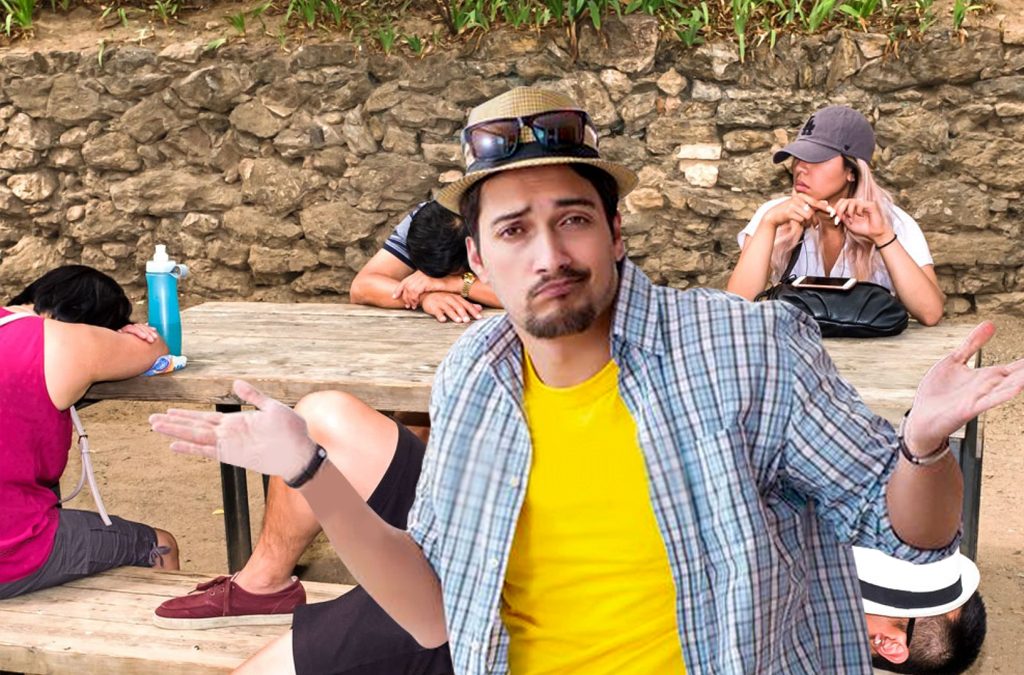
The Big Question: How to Get People Talking on Tour?
Let’s face it, no matter which part of the world we work in – all of us guides need to be comfortable talking to people we’ve just met. For many, this is an especially challenging part of the job and one that takes a lot of practice to improve.
Well to help you on your way, this week’s audience-driven tour guide training will offer 3 great tips on how to get people talking and avoid that dreaded awkward silence.
Done watching?
Share your personal experiences and tips for getting people chatting below! What has worked for you in the past? What is the one piece of advice you would give a brand-new tour guide?
Transcript:
Hi, everyone. I’m Kelsey from beabetterguide.com, and you’ve reached this week’s Q&A where you ask the questions and I’ll submit the answers.
Our first question is one I get asked all the time and that’s “How do I start great conversations with my guests?” Whether it’s on the first day, your first dinner, your first meeting.
How do I avoid that awkward silence? We’ve all had moments that probably went a bit like this… “So, Johnson, looks like you’re really into mustaches.”
Yeah, not my best line. But here are three ways that you can be a great conversationalist and get the ball rolling.
Well, for starters, try and avoid the usual conversation openers. These are the, “So, what do you do? Where are you from?” or “Crazy nice weather we’re having here, right?”
Instead, try and spice it up with one of these great conversation starters. “So, Steve, are there any personal passion projects that you’re working on this year?”
“Hey, Marie, what’s something that you do just for the fun of it?” “Mildred, is there anything that you’re working on, especially this year?”
You know, play with the words a little bit. But since you’re trying to open up, people can share their passions and hobbies with you.
Two, ask more how and why questions, instead of what or when questions.
So, for example, instead of saying, “Oh, what brings you on this tour? You should ask, “Oh, how did you choose this tour?” or “How did you choose to come to Uruguay?”
Another example might be if a group is there together on your tour, ask somebody, “Oh, how do you know so and so?”
That way you learn about the people on your tour and you can avoid those one-word answers that sometimes come with the other questions.
Three, be a passion detective. People love speaking about their passion. So, it’s up to you in conversation to be a careful observer and a close listener.
Here are some clues when somebody may be talking about one of their passions. They get a little more animated, maybe they go on a few more tangents, they start getting excited, their voice starts to rise.
If you see any of those clues, that’s a great direction to go in your conversations. Get interested on what that person is talking about and they’re going to open up to you.
And that brings us to today’s tweetable. Now, I’m new to the Twitterverse, but if you want to send this out there, this is shout out to my good friend, Eli Barns because he once told me, “In conversation, it’s always better to be interested than interesting.”
So, how to get people talking and be a great conversationalist, the three answers we gave today were, of course, avoid those usual openers, be a passion detective was the third one, and the second was ask more how and why questions.
So, I hope you enjoyed the video today. Share that tweetable if you’re inspired. Post in the comments below how you get people talking. And thirdly, of course, if you have any questions, submit them below and I’ll respond as soon as I can.
Thanks so much for being here and I’ll see you next time.
Team Guest Focus
English for Tour Guides

Being a tour guide is a very important job. In many cases, the tour guide is a traveller's first impression of a foreign country. In other cases a tour guide may be responsible for teaching tourists about the culture and sites in a city or town. In addition, many tour guides hold the responsibility of teaching tourists about safety. Even if you are only responsible for taking a tourist from the airport to his or her hotel, it is your responsibility to make the short trip interesting, informative, and safe. The following pages will help you learn some important vocabulary and phrases that you can use with your English-speaking tourists. Check your understanding as you go.
Improve your English. Speak with confidence!
- Free Mini Course

- Posted in in ESL Conversation Questions
70 travel conversation questions to practice your English
- Posted by by Cameron Smith
- January 27, 2023
- Updated April 20, 2023
Use this list of travel conversation questions to help your students practice their English speaking skills.
Almost everyone has a strong opinion or two on travel. Whether they love to travel by plane, train, or automobile or prefer to avoid travel altogether, these fun travel questions should spark some lively conversations in your classroom!
Travel conversation questions
- Where is the most interesting place you have ever visited?
- What activities do you like to do when you travel?
- Do you prefer to travel alone or with others?
- Have you ever traveled abroad?
- In your opinion, what is the ideal length of a vacation or trip abroad?
- What has been your most memorable travel experience?
- What are the benefits of traveling?
- What is the best way to save money while traveling?
- What type of transportation do you use when traveling?
- How often do you go on holiday trips?
- Do you ever travel for business? Would you like to?
- Have you ever gone on a long distance trip?
- How has travelling changed your life?
- What is the most exotic place you have ever visited?
- What do you think are the essential items to bring when traveling?
- What do you like most about traveling?
- What do you like least about traveling?
- When you travel, do you prefer to relax or seek out new adventures?
- Do you prefer traveling to cities or the countryside?
- Would you prefer to travel to a beach or the mountains?
- Do you prefer to plan your trips ahead of time or be spontaneous?
- Are you planning any trips right now? If so, where will you be going?
- What is one destination that everyone should see in their lifetime?
- What’s the best place for people to visit in your home country?
- What tips would you give someone who is traveling for the first time?
- How has technology changed the way we travel today?
- What challenges have you faced while traveling abroad?
- How has traveling abroad changed you?
- Are there any places that are still on your travel bucket list?
- What are the top 3 destinations on your travel bucket list?
- How do you like to prepare for your vacations?
- What is the most important thing you have learned while travelling?
- How do you make sure to stay safe while traveling?
- Are there any destinations that are too dangerous to visit? Why?
- Are there any places that should be off-limits to tourists?
- Have you ever encountered language barriers while travelling?
- How do you usually find accommodations when travelling?
- What kind of food have you tried while travelling abroad?
- Do you prefer to travel domestically or internationally?
- What is the most important thing to consider when planning a trip?
- What are your best tips for packing for a trip?
- Are you an “overpacker” or an “underpacker”?
- What tips can you give for packing light when travelling?
- What destination do you think is underrated and why?
- How has travelling helped you develop new skills?
- Have you ever gone on an adventure trip or safari?
- What tips do you have for staying healthy while traveling?
- Have you ever experienced culture shock?
- Are there any particular customs that surprised you while traveling abroad?
- How have your travels impacted your career choices and goals?
- What kind of souvenirs do you like to bring back from your trips?
- Are there any particular souvenirs that remind you of your travels?
- What are some of the biggest challenges of traveling solo?
- What are some of the advantages of traveling solo?
- Do you enjoy traveling with your family?
- Do you enjoy traveling with a big group of friends?
- Do you enjoy traveling with small children?
- When you travel, do you prefer to stay in hotels or Airbnbs?
- What unique activities have you done on vacation?
- Are there any places that have particularly stood out during your travels?
- Do you prefer guided tours or independent exploration when traveling to a new place?
- What tips can you give for budgeting while traveling overseas?
- How did the pandemic impact your future travel plans and goals?
- Have any of your travels inspired you in some way? How?
- Are there any places that have made a lasting impression on you during your travels?
- How do you make sure to respect local cultures and traditions when traveling abroad?
- Do you like to connect and chat with locals when you travel? If yes, how do you make it happen?
- What have you learned from other cultures during your travels?
- Has travel changed your perspective on different cultures and people? How?
- Has travel changed how people interact with each other across different cultures and countries? If so, how?
Are there any other ESL Discussion Topics and ESL conversation questions that you’d you like us to write about?
Let us know in the comments!
Get free English lessons via email
Subscribe to my newsletter and get English lessons & helpful resources once a week!
Unsubscribe anytime. For more details, review our Privacy Policy .
I agree to receive updates & promotions.
You have successfully joined our subscriber list.
Cameron Smith
I'm an English Communication Coach based in Vancouver, Canada. I'm on a mission to help millions of people speak English with confidence. Thanks for visiting this site! If you want longer video content, please follow me on YouTube for fun English lessons and helpful learning resources!

Post navigation

30 ESL conversation questions about soccer and football

- Posted in in Grammar
Why does English have so many homophones?
- January 29, 2023
Pep Talk India
School of public speaking.
- English Conversations
English Conversation: Between Tourist and Guide
- March 30, 2017
Tourists could be from any part of the world with different cultures and speaking foreign languages. But there’s one language that everyone speaks and understands: English. So, a tourist guide should enroll in public speaking training to hold a fluent conversation with the tourist. Like the one mentioned below.
ENGLISH CONVERSATION
Guide: Hey I am your guide whose gonna help you to explore Delhi today.
Tourist: Yeah sure.
Guide: This is the heart of Delhi which is also known as CP
Tourist: Could you please tell me the full form of CP?
Guide: Connaught Place.
Tourist: What’s so special about this place?
Guide: It’s the best place to hang out. A place where you can get almost everything. It’s not only a commercial hub but a transportation hub as well.
Tourist: Is this place good for shopping also?
Guide: Yes! Here you can get all the trendy and branded items of every range.
Tourist: Is there any shop famous for clothes?
Guide: Yes. Shop no. 36 near west block is very famous for clothes.
Tourist: What kind of clothes will I get there?
Guide: Ethnic as well as western clothes. Both the options are available there.
Tourist: Is there any place where I can click a lot of awesome pictures?
Guide: Yup! The Inner circle of CP is best for photo-shoot.
Tourist: What kind of environment is there?
Guide: It offers absolutely lively environment. There is also a central park where you can sit for hours and relax. And you can also take pictures of our nation flag which is right in the middle of that park.
Tourist: That’s marvelous. Could you please guide me there?
Guide: Yeah sure.
⇓ RECOMMENDED VIDEO
Like this article.
- Pingback: Shweta
- Pingback: Ravneet Kaur
Nice conversation
Leave a Reply Cancel reply
Business stories, english phrases, conversations, business english, public speaking, pro books bundle, collocations, writing skills, explore more, use these english phrases to navigate workplace communication .
Having a good command of Corporate English can go a long way in helping you draft a successful career. Simply knowing it isn’t enough. You
Tips For Effective English For Public Speaking
As the world becomes more interconnected, the ability to communicate effectively in English has become increasingly important. It is especially true in professional settings, where
Subscribe To Our Newsletter
Get updates and learn from the best, start your journey of successful speaking like 39,700 others did…., school of public speaking.
- A-3, 3rd Floor, Above Rajesh Plywood, Rajouri Garden, A Block, Near Raja Garden Chowk, New Delhi, Delhi-110027
- Email: [email protected]
© Copyright 2023 Pep Talk india - All Rights Reserved
Get your ebook worth ₹300 for free., thank you. we have sent email with pdf check it, book a call.

Login to my account
Enter your e-mail and password:
New customer? Create your account
Lost password? Recover password
Recover password
Enter your email:
Remembered your password? Back to login
Your cart is empty

TOUR GUIDE: INTRODUCTION TO DEBATE
Description.
Recommended in Program(s): Challenge I, Challenge II, Challenge III Cycle(s): N/A
Debate is not difficult when introduced step by step with humor before tackling serious topics. Learn debate by example with this fun filled text.
Accompanying video content can only be accessed, in CC Connected, by Classical Conversations members
- 8.5 x 11 softcover, spiral bound book
If you'd like to see a sample of TOUR GUIDE: INTRODUCTION TO DEBATE, click here .
Click HERE to view the Errata Sheet.
Payment & Security
Your payment information is processed securely. We do not store credit card details, nor do we have access to your credit card information
You may also like
Recently viewed.
Free Shipping on Qualified Orders $200 or More
Click the link to learn more: Shipping Policies
Satisfied or Refunded
Click the link to learn more: Refund Policies
Get 10% Off Your Order!
When your qualified cart subtotal is $250 or more! 10% Discount Info
Your Information Is Always Secure
Privacy Policy
- Opens in a new window.
We’re fighting to restore access to 500,000+ books in court this week. Join us!
Internet Archive Audio

- This Just In
- Grateful Dead
- Old Time Radio
- 78 RPMs and Cylinder Recordings
- Audio Books & Poetry
- Computers, Technology and Science
- Music, Arts & Culture
- News & Public Affairs
- Spirituality & Religion
- Radio News Archive

- Flickr Commons
- Occupy Wall Street Flickr
- NASA Images
- Solar System Collection
- Ames Research Center

- All Software
- Old School Emulation
- MS-DOS Games
- Historical Software
- Classic PC Games
- Software Library
- Kodi Archive and Support File
- Vintage Software
- CD-ROM Software
- CD-ROM Software Library
- Software Sites
- Tucows Software Library
- Shareware CD-ROMs
- Software Capsules Compilation
- CD-ROM Images
- ZX Spectrum
- DOOM Level CD

- Smithsonian Libraries
- FEDLINK (US)
- Lincoln Collection
- American Libraries
- Canadian Libraries
- Universal Library
- Project Gutenberg
- Children's Library
- Biodiversity Heritage Library
- Books by Language
- Additional Collections

- Prelinger Archives
- Democracy Now!
- Occupy Wall Street
- TV NSA Clip Library
- Animation & Cartoons
- Arts & Music
- Computers & Technology
- Cultural & Academic Films
- Ephemeral Films
- Sports Videos
- Videogame Videos
- Youth Media
Search the history of over 866 billion web pages on the Internet.
Mobile Apps
- Wayback Machine (iOS)
- Wayback Machine (Android)
Browser Extensions
Archive-it subscription.
- Explore the Collections
- Build Collections
Save Page Now
Capture a web page as it appears now for use as a trusted citation in the future.
Please enter a valid web address
- Donate Donate icon An illustration of a heart shape
Tour Guide: Introduction to Debate
Bookreader item preview, share or embed this item, flag this item for.
- Graphic Violence
- Explicit Sexual Content
- Hate Speech
- Misinformation/Disinformation
- Marketing/Phishing/Advertising
- Misleading/Inaccurate/Missing Metadata
plus-circle Add Review comment Reviews
206 Previews
4 Favorites
DOWNLOAD OPTIONS
No suitable files to display here.
PDF access not available for this item.
IN COLLECTIONS
Uploaded by station34.cebu on June 30, 2023
SIMILAR ITEMS (based on metadata)
Etiquette 101: Do You Pass as a Parisian? Or Are You Just Another Emily in Paris?
Are the waiters in Paris actually rude, or are you the problem? Parisians weigh in on how to not be that American tourist this summer.

Every item on this page was chosen by a Town & Country editor. We may earn commission on some of the items you choose to buy.
On the cover our summer issue, which focused entirely on Paris–a love note to the city that will experience the storm of couture week, men's fashion week, the Olympics , and a nail-biting election all in one summer– liberte , egalite , and scandale are emblazoned in red. Heading to Paris this summer? We've asked Parisians and other Francophones for a few tips on how to avoid the last word in the aforementioned trio.
What is the Paris Syndrome?
"There are so many videos online about 'how to dress French'," Joost Van Der Ree, a Paris-based fashion photographer tells T&C . "Tourists often try too hard, hunting for misguided tutorials on how to dress like a Parisian. True Parisian style is being original and yourself. Have some humor with it and put the beret down." It's like someone rolling up to Raoul's downtown in a look from Bass Pros Shop.
Ce Quoi... Oat Milk?
Comedian Andy Haynes once said, "I ordered oat milk in Paris and the waiter said no," and the TikTok skit below illustrates the situation. While trendy Parisian cafes like Coutume Cafe , Bonjour Jacob , and Le Peleton Cafe have alternative milk options, it might be more difficult to find them at traditional brasseries. Asking for it isn't so much of an etiquette issue, just a very American behavior.
Save Athleisure for Los Angeles
"It's not sexy, not chic," fashion designer Steven Passaro tells T&C . "Gym clothes should only be worn at the gym." According to him, you won't fit in with the locals if you're seen out and about wearing your Lululemons. But, those who are keeping up with their fitness shouldn't worry. He says running up and down the Seine or wearing athleisure at the sports club La Montgolfiere (rumored to be the go-to gym for designer Simon Porte of Jacquemus) is of course okay.
No, Not Everyone Needs to Hear Your Conversation
It was a quiet morning in the lobby of the Bulgari Hotel Paris during couture week in January. The sun was slowly peaking through the cloudy haze and the smell of fresh espresso wafted through the air. Suddenly: a thunderous voice with a distinctly American accent belted from across the room. "Parisians talk very low," Sofia Achaval de Montaigu, a Parisian-Argentinian socialite and founder of clothing brand Acheval Pampa , tells T&C . "It's like a city with no noise. When you are out at a restaurant or cafe, you always notice when Americans are around because they talk very loudly."
And, Let's Not Talk About Work
Unlike Americans, the French are pretty serious about their work-life balance and there's nothing more crass than talking business after 5 p.m. In fact, it's a pretty big faux pas to lead a conversation with "What do you do for work?" Try instead: a conversation about a new art exhibition. Extra points if the exhibit is at a lesser-known museum .
Is Duo Lingo Enough?
Who knows, but it's a start. This is a given regardless of your destination: try to speak the language of the place you are visiting. A simple "Bonjour Monsieur/Madame" can go a long way, even if the person you speak to replies in English. When I first started going to Le Comptoir de Saint Peres (an unpretentious cafe on the left bank where a few fashion big names frequent), they didn't receive my butchered French well. But, after a month or so, they let me stay at my table during lunch rush hour. The two English-only speakers next to me were booted out. It felt like being back in middle school when the mean girl was finally nice to you: the ultimate approval.
Coffee is a Luxurious Ritual, Not a Rushed Necessity
I have never felt more American (and out of place in a European country) than when I took an espresso to go early on in my cliche Hemingway-esque life in Paris. "The whole take-out coffee thing, for sure," Achavel de Montaigue says when asked what sets Americans apart. "Parisians are all about having coffee in cafes. There is a ritual around it, and having a moment to stop and have coffee is important to us."
Style News Editor at Town and Country covering society, style, art, and design.

@media(min-width: 40.625rem){.css-1jdielu:before{margin:0.625rem 0.625rem 0;width:3.5rem;-webkit-filter:invert(17%) sepia(72%) saturate(710%) hue-rotate(181deg) brightness(97%) contrast(97%);filter:invert(17%) sepia(72%) saturate(710%) hue-rotate(181deg) brightness(97%) contrast(97%);height:1.5rem;content:'';display:inline-block;-webkit-transform:scale(-1, 1);-moz-transform:scale(-1, 1);-ms-transform:scale(-1, 1);transform:scale(-1, 1);background-repeat:no-repeat;}.loaded .css-1jdielu:before{background-image:url(/_assets/design-tokens/townandcountrymag/static/images/diamond-header-design-element.80fb60e.svg);}}@media(min-width: 64rem){.css-1jdielu:before{margin:0 0.625rem 0.25rem;}} Etiquette @media(min-width: 40.625rem){.css-128xfoy:before{margin:0.625rem 0.625rem 0;width:3.5rem;-webkit-filter:invert(17%) sepia(72%) saturate(710%) hue-rotate(181deg) brightness(97%) contrast(97%);filter:invert(17%) sepia(72%) saturate(710%) hue-rotate(181deg) brightness(97%) contrast(97%);height:1.5rem;content:'';display:inline-block;background-repeat:no-repeat;}.loaded .css-128xfoy:before{background-image:url(/_assets/design-tokens/townandcountrymag/static/images/diamond-header-design-element.80fb60e.svg);}}@media(min-width: 64rem){.css-128xfoy:before{margin:0 0.625rem 0.25rem;}}

Common Courtesy: Nicola Coughlan & Luke Newton
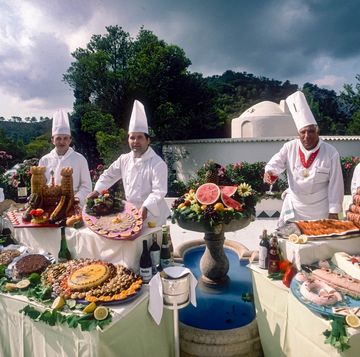
Yes, Serving Food Buffet-Style Can be Chic.
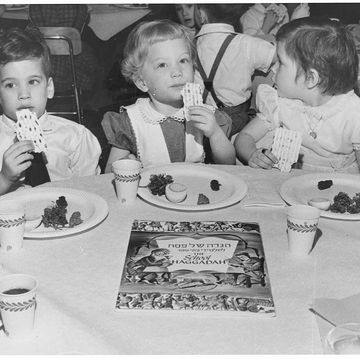
26 Thoughtful Passover Gifts for Your 2024 Seder

Truman Capote and the Lessons of Etiquette

Etiquette 101: Sharing College Acceptance News

Faux Pas? Moi?

Tips For Giving Wine? Don't Be Boring

How to Behave at a Dinner Party on Ozempic
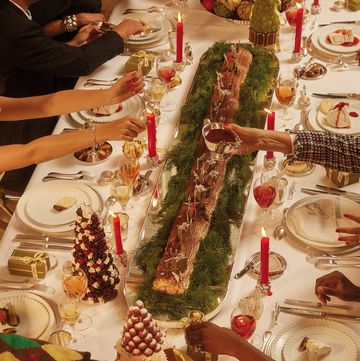
How to Set the Table Right, Once and For All

The Tipping Omertà
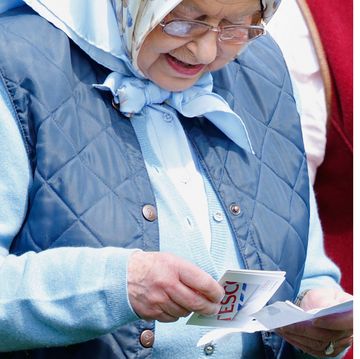
To Give or Not to Give a Gift Card
Every product is independently selected by (obsessive) editors. Things you buy through our links may earn us a commission.
The Best Ties for Men, According to Stylish Guys

“A great tie is more than a piece of fabric — it’s a window into the soul and a conversation starter,” says Jake Bell , the writer behind the daily Substack Who Do You Know? . I have to agree: So much more than the de facto Father’s Day gift , a tie can make an entire outfit. We all have memories of our first — junior prom, Diane Keaton in Annie Hall , or a scratchy rental for a cousin’s wedding. But just as easily as an understated silk number can pull together a look, a bad tie (hello, piano keys) can ruin an otherwise decent fit. So to help you find some nice-look options, I tapped well-dressed men to hear their takes on what makes not a great tie but the best tie. Turns out, some of the best ties on the market are vintage, skinny ties are dead, and silk is the way to go. I’ll let them explain.

Cody Min , founder of the creative studio Astronaut Monastery , has a large tie collection — and a few general rules for what makes a good tie today. “Width is quite important to me,” he says. “You want to avoid those super-skinny pencil-width ties and go with a bit of heft and weight. Don’t overdo it and verge into clown territory.” His favorite tie in his collection? A J. Press number, which was a gift from his wife and that he says he loves for its classic prep stripe on dark navy wool. Plus, the price point feels accessible for those just beginning a collection of their own.
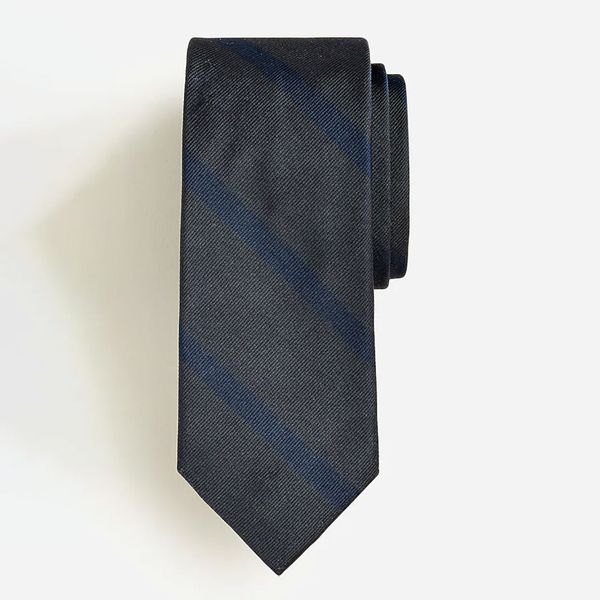
You really can’t go wrong with a simple tie from J.Crew. I’d suggest you stick to stripes or solids from the retailer, and save your fancy patterned picks for more off-the-beaten-path brands or vintage markets (thus lowering the chance of showing up to an event wearing the same tie as the guy seated next to you). J.Crew’s English silk tie is remarkably easy to wear, a great length for most people, and elegant while still feeling casual enough for a weekday dinner.

While DTC menswear brands don’t always deliver the most stylish pieces, Bonobos offers a surprisingly good treasure trove of on-sale patterns in high-quality materials. Made of 100 percent silk, this Italian number from the brand is pretty innocuous and kind of perfect for when you just want a reliable tie at a not-too-bad price.

Bell as well as Xavier Donnelly , creative director at Ash Hotel s, and Jason Stewart , a DJ and co-host of How Long Gone , all recommend shopping for a vintage Hermès tie, which you can come by at a fairly reasonable price. The RealReal keeps a steady rotation in stock, but it’s also worth trying your luck on less curated sites like eBay and Poshmark or your local resale store. Search by color (Donnelly told me he wears his light-blue vintage Hermès tie most often), and keep a reference of ties you like in a photo album so you’ll know what to keep an eye out for when you’re out and about.

“The benefits of a tie are in the things unseen — the attention to detail makes it stand apart,” says Louis Geramita , who owns a small tailor shop and spends his days helping guys upgrade their style by bestowing actionable advice. Incorporating a tie into an otherwise mundane outfit is one such tip. Geramita recommends this tie, which he says is incredibly durable, making it worth the price. Handcrafted and inspired by vintage Italian designs, it’s an ideal tie to add some flavor to your more contemporary pieces.

Shopping Cordings for ties is a recommendation from Stewart, along with Chase Winfrey , men’s brand manager at J. McLaughlin , who told me, “You can never go wrong with a plain navy knit — I always travel with a plain navy cotton knit and it has saved me on many occasions.” On the occasions when something a bit more festive is in order, both Stewart and Winfrey love the silk options from this British country clothier. This Flock of Birds tie features an upper crust-y assortment of pheasants and turkeys (English country estate not included).

Benjamin Kelly is the founder of Dinosaur Hampton , a clothing line based in Minneapolis, who told me that his best tie tip is to always start your look with a white button-down. “Like the first paint stroke on a canvas, you will have the whole world ahead of you in a clean white shirt,” he says. “Then you get to play hard and work hard as you try different tie styles and colors.” His preferred tie is from Ralph Lauren — specifically, one that’s not “too stiff” and that has “some flow-y personality, a tie that isn’t afraid to go where the wind takes it.” This pony-print one is just that.

For Christopher Echevarria , founder and creative director of Backstock & Weber and Academy , a great tie is one of two things: very silky or very much not silky. “The silky ties I like are a bit wide,” he says. “I’m a big fan of the versatility of knit ties as well.” He’s been collecting ties since the early 2000s, especially ones from Atelier Alexander Olch, which have stood the test of even the most robust closet clean out. Here’s his quick styling tip: The wider the lapel, the wider the tie.

“A hand-rolled edge, lightweight interlining, an interesting print or a unique stripe”: That’s what Winfrey looks for in any tie. Since he wears a tie three-to-four times a week and works in menswear, we’ll take his $230 pick as worthy of the splurge. It’s from the store Marinella in Naples, which Winfrey says produces “really beautifully understated ties with silks screenprinted in Macclesfield.” He adds that he also collects vintage club ties, often from eBay, that were designed for different clubs or specialty men’s shops. “Some of the best ones in my collection come from Chipp , who were tailors for JFK, among a long list of others,” he says.

One of Bell’s favorite ties comes from Drake’s, the king of downtown New York menswear brands. “Drake’s is a classic option for tasteful, unique ties, all of which are handmade in London. It offers everything from your standard stripes and dots to complex paisley prints, and you can get them in silk, wool, or cashmere,” says Bell. Straddled somewhere between modern and classic, the designs feel like a nod to trends while still looking like something you’ll want to wear for decades to come.

Bell warns that this leather tie is expert level, as proven on Ayo Edebiri earlier this year. “Bottega Veneta continues to find garments to craft in leather — my favorite being the spring ’23 leather flannel — and this tie is incredibly chic,” he says. If this option is outside your budget, try looking for a similar deep burgundy shade in a silk or knit.
The Strategist is designed to surface useful, expert recommendations for things to buy across the vast e-commerce landscape. Every product is independently selected by our team of editors, whom you can read about here . We update links when possible, but note that deals can expire and all prices are subject to change.
- the strategist
- men's fashion
- men's apparel
- ask a cool person
Every product is independently selected by (obsessive) editors. Things you buy through our links may earn us a commission.
Deal of the Day
Micro sales, greatest hits, most viewed stories.
- The Best Early Prime Day Deals Under $50
- New Stuff Alert: Horse-Shaped Baggu and Salmon Gold Hoops
- I Discovered These Japanese Sandals in Basque Country
- The 8 Best Carry-On Backpacks
- The 11 Very Best Shampoos
- The 16 Very Best Protein Powders
Today’s Top Clicked

- Account Settings
- Aston Martin
- Lamborghini
- Mercedes-Benz
- Rolls-Royce
Car Reviews
Car comparisons, auto resources.
- Auto Insurance
- Auto Glass Repair
- Auto Warranty
- Product Roundups
Top stories

- Manufacturers
VIDEO: Tour The 2025 Volkswagen Golf R
The new model sees a slight power increase, delivering 328 horsepower, up from the previous car's 315. Torque remains unchanged at 310 pound-feet. The powertrain retains its familiar setup, featuring a seven-speed dual-clutch transmission and an all-wheel-drive system. As anticipated, a manual transmission option is not available.
The exterior of the 2025 Golf R has received several updates, including redesigned headlights and taillights, a new grille, and a revamped front bumper. The badge is now illuminated, adding a modern touch. Inside, the 2025 Golf R maintains its familiar layout but introduces a larger 12.9-inch infotainment screen, equipped with the latest operating system seen in the new ID models.
Please show your support and subscribe to our YouTube channel !
Become an AutoGuide insider. Get the latest from the automotive world first by subscribing to our newsletter here .
More by AutoGuide.com Staff
Join the conversation
Popular articles.

Sibling Rivalry: Toyota Crown Signia vs Toyota Venza

Ford Kills Key EV Program

Mustang Mach-E Price Cut Below $30K

2024 Hyundai Santa Fe Hybrid Quick Take: Checking the Box

Comparison Test: 2024 Kia EV9 vs 2024 Mazda CX-90 PHEV
Latest comparisons.

2024 Porsche Cayenne S and Cayenne Coupe Review

What’s the Difference Between the 2023 and 2024 Subaru Crosstrek?

Volkswagen Atlas SE Vs SEL: Which Trim is Right for You?

Hyundai Palisade Vs Mazda CX-90 Comparison
Car buying tools.
- How to Buy a Car
- Free dealer Price Quote
You may also be interested in

2025 Volkswagen Golf R Trades Manual Transmission For More Power

Every Detail Of The 2025 Volkswagen Golf R

2025 Volkswagen Golf R Has This Much More Power

Volkswagen Golf R – Review, Specs, Pricing, Features, Videos and More

2015 Volkswagen Golf R Video, First Look

2024 Dodge Charger Daytona 3-Door Ushers in the Muscle EV Era

Fiat Announces Next 500e Special Editions for US and Canada

Unsold Fisker Oceans Sitting In California Parking Garage

The AutoGuide Show Ep 10: Jonny Lieberman, VW EVs, and a Ford Patent

2025 Kia Carnival Debuts With Efficient New Hybrid Powertrain

Imola Yellow Returns With Audi RS4 Avant 25

Genesis Announces High-Performance Magma Program, Reveals 2 Models

Ford Announces Recall to Prevent Potential Fire Risk in Popular SUVs

2025 Ford Mustang GT 60th Anniversary is a Retro Diamond Jubilee

The 2025 Mazda CX-70 Starts At $41,820

The 17 Best 0% APR Deals Right Now

Genesis and Toyota Win Big in 2024 Canadian Car of the Year Awards
More From Forbes
A guide to norway’s coastal cruise with havila voyages.
- Share to Facebook
- Share to Twitter
- Share to Linkedin
Four Havila Voyages ships operate on the Norwegian coastal route.
Every day of the year, a ferry sets sail from Bergen, Norway’s second biggest city. It calls at 34 ports before arriving at Kirkenes, close to the Russian border, before making its way back to Bergen. This is the Norwegian coastal route.
Given that the ferries stay close to shore, they offer one of the best ways to experience the stunning Norwegian coastline, explore the remote Arctic region, visit tiny coastal communities, and truly soak up Norwegian culture.
In addition to the important passenger and cargo ferry service, the route is known around the world for its cruise-like voyages sold to tourists.
For a few decades, Hurtigruten was the only company serving the route. But now, four of the 11 ferries plying the route are operated by Havila Voyages , the latest in a long list of companies providing service over the coastal route’s 130-year history .
From delightful dining to brand-new ships specifically designed for the route, here’s what to expect from the new kids on the block.
Bolivian General Arrested After Breaching Presidential Palace In Alleged Coup Attempt—Here’s What To Know
Iss astronauts take shelter after russian spacecraft breaks up in orbit, thunder takes high upside swing in 2024 nba draft with nikola topic, havila voyages concept explained.
Typically, international tourists choose from three voyages: the northbound leg, the southbound leg, or the full 11-night roundtrip voyage. The experience of each voyage is akin to taking a cruise but on a ferry.
Passengers on the Havila Polaris out on deck making the most of the arrival into Tromsø, Norway.
The modern ships are comfortable with plenty of space—inside and out—to enjoy the scenery and excellent dining, although there is limited entertainment beyond the landscapes outside and the multiple ports of call.
Trying to choose? The northbound voyage includes longer port stops in cities like Ålesund, Trondheim, and Tromsø. However, the shorter southbound voyage is a little cheaper and includes the delightful sailing through Vesterålen and the Raftsund waterway.
It’s also possible to book shorter voyages, such as Trondheim to Tromsø, or book port-to-port transit between any two ports on the route.
All four ships in Havila Voyages’ coastal fleet are identical. They’ve been designed specifically to sail this historic route, so come with comfortable cabins and tall windows designed to fill the interiors with light and provide plenty of opportunity to enjoy the sights along the Norwegian coastline.
The fleet runs on LNG and each vessel is capable of running emission-free on battery power for up to four hours. This means it will still be able to visit the Geirangerfjord after Norway’s new environmental regulations come into force from 2026.
In fact, to take advantage of this capability, Havila has extended its Geirangerfjord season on the coastal route, adding April and May onto the previous June-August season from 2025.
Large windows are the standout feature of the new Havila Voyages cruise ferries.
The best value accommodations, inside cabins, are designed for port-to-port passengers and shorter journeys, although it is possible to book one for the full voyage. However, for a slightly higher price, the seaview cabins offer significantly more space and comfort for those on a longer voyage.
A few comfortable lounges are dotted around the ship, including the excellent observation lounge. Packed with comfortable seats, the lounge’s vast windows ensure a good view no matter where you sit.
Where Havila’s ships really shine is on the outside decks. Whether you’re hunting for the northern lights in the winter or watching small communities pass by late into the evening under the midnight sun, there’s so much space to take in your surroundings.
A pair of good-sized hot tubs and an outdoor bar open for special events add to the appeal.
Dining Options
Whereas cruises are renowned for lavish buffet restaurants, Havila Voyages offers guests an all à la carte concept. In an effort to reduce food waste , breakfast and lunch consist of unlimited small dishes made to order, while a more traditional three-course dinner is available daily.
The meals are supplemented by snacks and light meals available from the onboard cafe, which is also used by local ferry passengers. A fine dining restaurant with a fixed menu of local cuisine offers an alternative dining option at an additional charge.
A la carte dining three times a day is one of the big plus points of Havila Voyages.
Finally, local dishes are put under the spotlight at specific events, often held out on deck and timed for sailaways or scenic points in the journey.
Onboard Entertainment
The biggest difference from a traditional cruise is the lack of any onboard entertainment. The focus of the Norwegian coastal route is the nature, landscapes, and multiple daily port calls.
Daily talks are held by the onboard team covering the main ports and an introduction to Norwegian culture, but there are few other activities. Many passengers choose to bring books, knitting, or a good pair of binoculars. During the midnight sun period, there will always be something to see.
Port calls range from just 10 minutes in the middle of the night to several hours in bigger cities like Trondheim and Tromsø. Excursions are available covering activities such as dog sledding and snowmobiling in the winter to guided hikes and beer tasting. Bus tours to the North Cape and the Kirkenes Snow Hotel are always popular.
How Much Does It Cost?
As the Norwegian coastal route is operated on behalf of the Norwegian government, the ships are Norwegian flagged, use Scandinavian-speaking employees, and must abide by Norwegian law on things like alcohol taxes and duties.
All of these factors raise the price of a voyage compared with an equivalent cruise. But that being said, no cruise gets as close to the coastline or visits such small, remote Arctic communities as the coastal route.
11-night roundtrip voyages start from approximately $1,250 (inside) per person and $2,100 (seaview) per person, based on two people sharing a cabin. Prices rise significantly in the summer season. If roundtrip voyages are sold out, there may still be availability on one-way voyages (especially southbound) or port-to-port journeys.
Beverage packages are available, but they are offered as a discounted pre-payment package rather than an unlimited model offered by most cruise lines. If you’re traveling as a couple and you like a drink with dinner, a package will probably prove better value than buying individual drinks.

- Editorial Standards
- Reprints & Permissions
Join The Conversation
One Community. Many Voices. Create a free account to share your thoughts.
Forbes Community Guidelines
Our community is about connecting people through open and thoughtful conversations. We want our readers to share their views and exchange ideas and facts in a safe space.
In order to do so, please follow the posting rules in our site's Terms of Service. We've summarized some of those key rules below. Simply put, keep it civil.
Your post will be rejected if we notice that it seems to contain:
- False or intentionally out-of-context or misleading information
- Insults, profanity, incoherent, obscene or inflammatory language or threats of any kind
- Attacks on the identity of other commenters or the article's author
- Content that otherwise violates our site's terms.
User accounts will be blocked if we notice or believe that users are engaged in:
- Continuous attempts to re-post comments that have been previously moderated/rejected
- Racist, sexist, homophobic or other discriminatory comments
- Attempts or tactics that put the site security at risk
- Actions that otherwise violate our site's terms.
So, how can you be a power user?
- Stay on topic and share your insights
- Feel free to be clear and thoughtful to get your point across
- ‘Like’ or ‘Dislike’ to show your point of view.
- Protect your community.
- Use the report tool to alert us when someone breaks the rules.
Thanks for reading our community guidelines. Please read the full list of posting rules found in our site's Terms of Service.

IMAGES
VIDEO
COMMENTS
Sample Tour Guide Speech in English. This page covers vocabulary needed by people working as tour guides in an English-speaking context. Listen to a tour guide on a shuttle bus from the airport to the resort. You can listen first, and then read. After that, test your understanding with the quick check.
As a tour guide you will face new challenges every day. One of the hardest parts of your job may be answering questions. ... Sample Conversation. Guide: If you have any questions while we're going along, please don't hesitate to ask. Man: I have a question actually. Guide: Sure, what's that? Man: Where's the best place to have dinner around here?
One of the best ways to improve your tour guide English is to immerse yourself in the language. Listen to English podcasts, watch English-speaking tour guides in action, and engage in conversations with native English speakers whenever possible. This exposure will help you become more familiar with the language and build your vocabulary.
Welcome to the ESL discussion session focusing on the importance of English language skills!. Enhancing your abilities in English conversation and speaking can greatly improve your interactions as a tour guide.Let's explore how honing these skills can help you engage with diverse groups, deliver information effectively, and create a welcoming environment for your guests.
Sample Conversation. Guide: It's about a three minute ride up to the top of the mountain. As we pass the two towers the gondolla may sway a little. Man: This thing is safe, right? Guide: Yes, you don't have anything to worry about. We do about 100 trips a day up the mountain, and these tours have been going on for over ten years without any ...
Discover the magic of "English for Tour Guides" at MyEnglishPlace! This special section is your go-to resource for all things related to giving amazing tours. Dive into sample tour conversations, explore lessons on various tour topics, and boost your language skills. Whether you're just starting or have been guiding for a while, our lessons are….
Welcome to our ESL discussion session on the importance of English language skills!Let's delve into how mastering English can open up a world of opportunities and enhance your travel experiences. Join us as we explore the significance of English in communication, career advancement, and cultural immersion. Get ready to engage in lively conversations and broaden your understanding of the ...
A Guide to Positive Conversations as a Tour Guide or Driver. Being a tour guide or driver is more than just getting people from point A to point B. It is about providing a positive, informative, and enjoyable experience for the guest or customer. It starts with the initial conversation when you are the first person they meet upon arrival to ...
Welcome to the 95th episode of our English listening practice series, featuring daily conversations with tour guide 🧭🧳🚌. In this 30-minute video, you will...
7. What weather can you expect? If your tour requires you to go up a gondola to a mountaintop covered with mist, or to get on a windy ferry to an island, or to walk for two hours in the summer ...
Become more than just a walking encyclopedia or the driver who knows stuff. No matter where you live or work, as a tour guide you should be able to speak English correctly to make your tours more engaging and to communicate your ideas well (especially if you work in a non-English speaking country!) Being able to start and keep a conversation going with your clients will make you stand out from ...
Tour guides show individuals or groups of people around establishments and provide them with information on the location, such as its history and traditions. If you're interested in becoming a tour guide, it's important to prepare for an interview after applying for a position. Reviewing common tour guide interview questions can help you feel ...
English speaking: Information for tourists and visitors. In the Tourist Information office you can ask about the opening hours (or opening times) for parks, museums and galleries, etc. You can also ask if there is an entrance fee or admission cost. For many attractions there is a car park nearby (but not always free parking ).
Travel conversation questions 2 Before starting the discussion with this second set of questions, be sure the students are familiar with the terms - landscape, ecotourism, issue (problem), journey, baggage, and souvenir.
Instead of having a long list of travel conversation questions, it is better to have them categorized to make everything easier. These are 60 travel conversation questions that have been divided into different categories such as: #1. Places. #2. People.
This week's audience-driven tour guide training will offer 3 great tips on how to get people talking and avoid that dreaded awkward silence. ... Three, be a passion detective. People love speaking about their passion. So, it's up to you in conversation to be a careful observer and a close listener. Here are some clues when somebody may be ...
English for Tour Guides. These pages from our English for Work series cover language needed by tour guides in an English-speaking context. Being a tour guide is a very important job. In many cases, the tour guide is a traveller's first impression of a foreign country. In other cases a tour guide may be responsible for teaching tourists about ...
70 travel conversation questions to practice your English. Practice your English speaking skills with these fun questions about travel. Use this list of travel conversation questions to help your students practice their English speaking skills. Almost everyone has a strong opinion or two on travel. Whether they love to travel by plane, train ...
Anna: Penelope, the Lincoln Memorial is coming up on your left! Boy: You're going to love my Lincoln Memorial Fun Fact! Anna: Oh, please tell us! Boy: On a wall inside the memorial, the word ...
March 30, 2017. 3 Comments. Tourists could be from any part of the world with different cultures and speaking foreign languages. But there's one language that everyone speaks and understands: English. So, a tourist guide should enroll in public speaking training to hold a fluent conversation with the tourist. Like the one mentioned below.
The topic - A conversation between a customer and a tour guide about a city walking tour is IELTS Listening part 1. The candidate needs to answer the following IELTS Listening question types: Fill in the blanks; Table completion; Audio Transcript: You will hear a conversation between a customer and a tour guide.
Debate is not difficult when introduced step by step with humor before tackling serious topics. Learn debate by example with this fun filled text. Accompanying video content can only be accessed, in CC Connected, by Classical Conversations members. 8.5 x 11 softcover, spiral bound book. 108 pages.
Tour Guide: Introduction to Debate by Classical Conversations. Publication date 2016-01-01 Publisher Classical Conversations, Inc. Collection internetarchivebooks; inlibrary; printdisabled Contributor Internet Archive Language English. Access-restricted-item true Addeddate 2023-07-01 15:49:31
Every item on this page was chosen by a Town & Country editor. We may earn commission on some of the items you choose to buy. You hear it all the time from fellow Americans. "The waiters in Paris ...
Writer Erika Veurink talked to stylish guys about their favorite silk ties and knit ties, and she heard recommendations for styles from J.Crew, J. Press, Bonobos, Drake's, and more.
Weekend Event Guide: Let Bike Summer commence! Weekend Event Guide: Hagg Lake, unicorns, Dirt Wave, and more ... Broad support for bike paths at state transportation tour stop in Tillamook 'Community conversation' sparked by Alpenrose development focuses on transportation.
The new model sees a slight power increase, delivering 328 horsepower, up from the previous car's 315.Torque remains unchanged at 310 pound-feet.The powertrain retains its familiar setup ...
Every day of the year, a ferry sets sail from Bergen, Norway's second biggest city. It calls at 34 ports before arriving at Kirkenes, close to the Russian border, before making its way back to ...